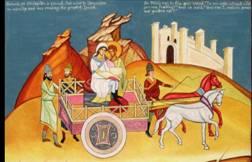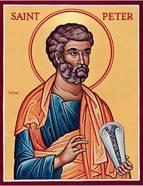The Beginnings: Gospel to the Gentiles
WEEK 2: SPREAD OF THE GOSPEL TO GENTILES
 Philip and the Ethiopian Eunuch:
Philip and the Ethiopian Eunuch:
- Read the story in Acts 84-8, 26-40: This Philip was not the apostle Philip, but one of the seven deacons appointed by the Church in Jerusalem. What is a eunuch? (a courtier of the Queen of Ethiopia) He was one of the many throughout the Roman Empire seeking meaning in the Jewish Scriptures. What did Philip do to set the man apart as a Christian? (baptize him) To this day, we are baptized at the time of belief; it is the sacrament of initiation. Even Jesus was baptized. At which feast do we celebrate Jesus’s baptism? (Theophany) This man was an Ethiopian, a non-Jew. Yet, Philip found that to be of no importance in allowing his baptism.
- Today, our baptismal service is longer and more formalized. Review it briefly here:
|
Action |
Meaning |
|
1. We face the East. |
Light comes from the East; God gives light to our souls. |
|
2. Priest breathes on the face of the child. |
God breathed life into Adam; Baptism will breathe New Life into the soul. |
|
3. Priest’s hand on child’s head. |
Child enters the shelter of the Church. |
|
4. Exorcism: Face West.
Spit on Satan. |
Drives Satan away: West means Darkness; Satan is the Prince of Darkness. Shows our hatred of the devil. |
|
5. Profession of Faith (Creed), facing altar. |
Testify to our Faith in God, turning to Him and from Satan. |
|
6. With his hand, Priest makes a cross in the water; he then blows on the water and prays. |
All evil is driven from the water, which is made holy. |
|
7. Oil is poured on the water. |
Purifying of Baptism (water) is only possible through God’s Holy Spirit (oil). |
|
8. Anointed of parts of body with oil. |
Oil of gladness for healing, in preparation for His new life. |
|
9. Dipping 3 times in the name of the Trinity. |
All sins are washed away: buried with Christ (under water) and risen with Christ: Child dies to sin and is born again to God. |
|
10. White robe of holiness. |
Clean and pure new life in Jesus. |
Peter and Cornelius:
- Read the story of Peter and Cornelius in Acts 10. Read aloud, breaking up the passage around the class. The Jewish people called all other people “Gentiles” and did not associate with them. Can the students recall any instances when Jesus did talk to a non-Jew, or even perform a miracle? (the Samaritan woman at the well, the Roman centurion’s servant) . Remind them also (or reread) that God gave a strict law to Moses that included which animals were “clean” and which “unclean”. “Unclean” animals were not allowed to be eaten, just as we do not eat meat during Great Lent. Review the definition of clean: animals that have divided hooves and chew cud and sea creatures with fins and scales. Can the students suggest some animals that are clean? Unclean? Discuss, then, the importance of Peter’s vision and its significance in his willingness to visit Cornelius. But, what action on the part of God Himself prepared Peter to baptize these Gentiles? In our sacrament of Chrismation, the Holy Spirit also descends on the newly illumined.
- Review for a moment the service of Chrismation. Do we see tongues of fire now?
|
Action |
Meaning |
|
1. Anointing with holy chrism of the child’s forehead, eyes, nose, lips, ears, chest, hands, and feet |
“The Seal of the Gift of the Holy Spirit” – our entire body becomes the temple of the Holy Spirit |
|
2.Sponging off of the holy chrism. |
God’s work is now invisible, in the way we think and live and act. |
|
3. Tonsure – cutting a lock of hair in the shape of a cross |
Dedication of our who life to God forever. |
|
4. Procession – around to baptismal font and then to the Eucharist |
The door is now open to full and complete communion with God. |
- Play a learning game: Quotations – Have the students identify the speaker:
“Now send men to Joppa, and send for Simon whose surname is Peter.”
 “Rise, Peter, kill and eat.”
“Rise, Peter, kill and eat.”
“I have never eaten anything common or unclean.”
“Behold, three men are seeking you.”
“I am he whom you seek.”
“Stand up; I myself am also a man.”
“I sent to you immediately, and you have done well to come.”
“In truth I perceive that God shows no partiality.”
“Can anyone forbid water, that these should not be baptized..?
Primstav: Add St. Philip on October 11 and St. Peter the Apostle on June 29 to your Primstav. What symbols do the students want to use to represent these great saints? Remember, the early Scandinavians could not read and used these to remember the feast days. Since we can read, it may help to keep a listing of the symbols chosen and which saint they stand for. A Primstav kept in a family for generations would be well-known to all members, but new symbols just chosen would be easy to forget.
Close with prayer.